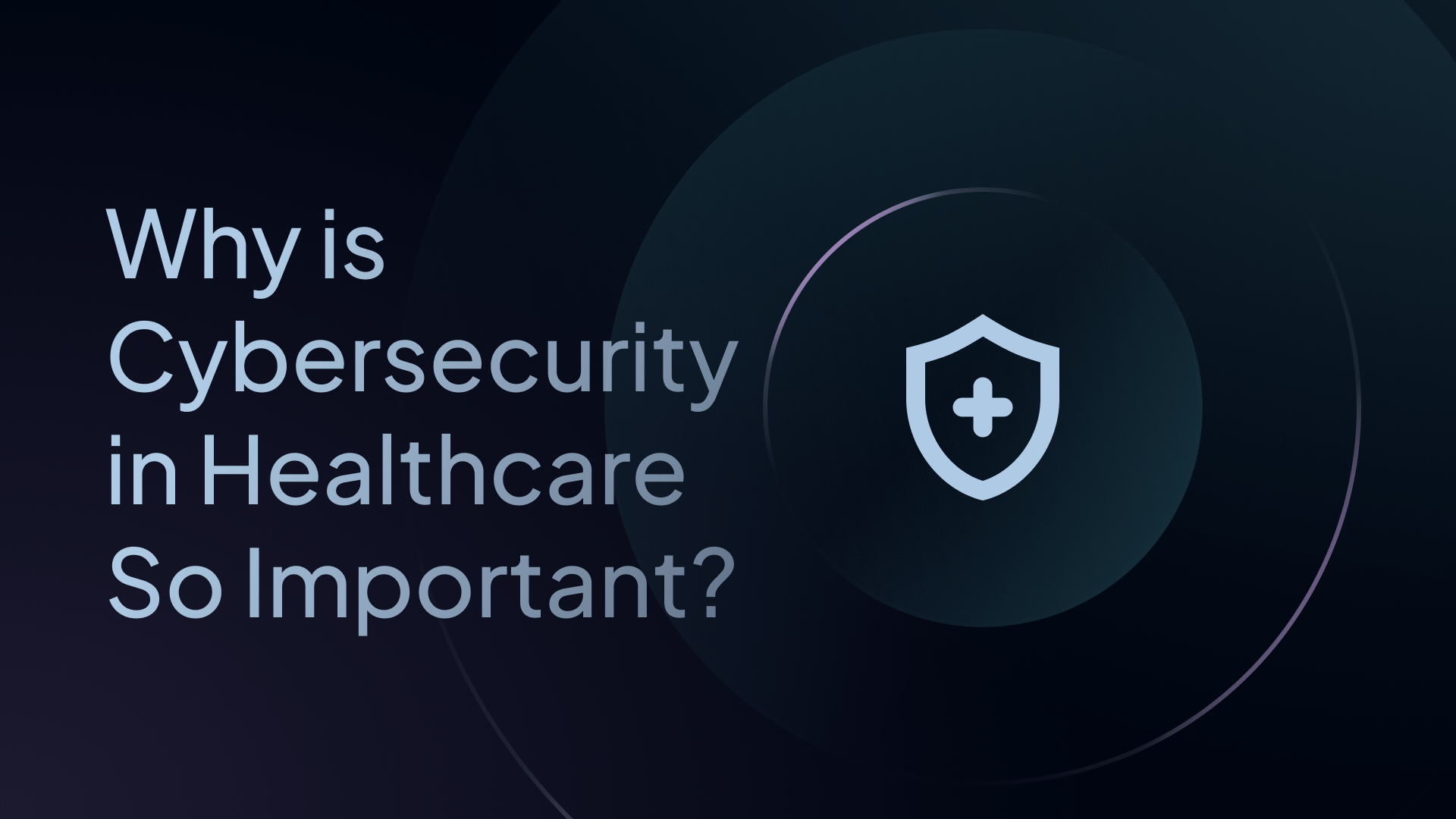Why Is Cybersecurity In Healthcare So Important?
Find out how to protect patient safety, privacy, and avoid penalties by utilizing these cybersecurity best practices.

All it takes is one weak point in your security systems for a cyberattack to occur, potentially costing you tens of millions of dollars within a matter of seconds.
This is especially important for the healthcare industry. In 2023, the healthcare sector was the most targeted industry for ransomware in the United States.
There are some key reasons why the healthcare industry is a prime target for cybercrimes and why cybersecurity is so important.
This article explores all of these and offers actionable steps you can take to mitigate them.
Table of Contents
Why is cybersecurity in healthcare so important?
Why are cyber attacks high in the healthcare industry
How to improve cybersecurity in the healthcare industry
Conclusion
Why is cybersecurity in healthcare so important?
There can be serious adverse effects on patient privacy and safety with their data being sold online, or changes being made to their medical records. Healthcare organizations can also incur substantial financial costs and penalties and face legal consequences for data breaches, negatively impacting their reputation and future business.
Let’s look at these in more detail.
1. Patient safety and privacy
The obvious consequence is that someone can sell the patient’s personal information on the dark web and use it for identity theft, financial fraud, and other malicious intent.
This alone should motivate providers to bolster their cybersecurity. But, the most damaging aspect to patient safety is their health.
Once hackers have access to private patient data on the provider’s operating systems, they can encrypt the entire network, thus blocking access to anyone trying to get in. This leaves doctors and clinicians locked out of accessing the necessary information to treat their patients adequately.
Additionally, patient records can be changed and altered at will. This can result in a patient being misdiagnosed and undergoing the wrong treatment, again putting the patient’s health at severe risk.
2. Financial costs and penalties
Healthcare data breaches can prove to be incredibly costly for providers. A 2020 review found that the cost of a breached record in healthcare was a whopping $429 vs $150 per record in other industries.
Now, imagine you have 100,000 patients on file. That’s a staggering $42,900,000 – and that’s excluding costs associated with fines and penalties, court settlements, and legal fees.
3. Loss of reputation
Trust is fundamental in the healthcare industry, and it should come as no surprise that once it is broken, it can be challenging to regain it.
Regardless of what security measures you take after falling victim to a cyberattack, you will no longer be trusted to safeguard patient data, which can result in existing and new patients going elsewhere.
Therefore, it’s crucial you take the necessary measures to prevent such attacks from happening in the first place.
4. Legal consequences
Depending on the cyber attack and the country you’re located in, you’re likely to face charges from your country’s regulatory body.
In the U.S., you must notify the Department of Health and Human Services, who will conduct a thorough investigation. If you are found to be liable, you will certainly face charges, both from the regulatory board and from the individuals and third parties affected by the attack – the last thing you want is to fight charges in a court of law.
Why are cyber attacks high in the healthcare industry?
The healthcare industry is a hotbed for cyber attacks for various reasons, such as hackers’ ability to access precious patient data, outdated technology, and lack of employee training on cybersecurity.
1. Highly valuable patient data
Patient records contain an abundance of valuable information, such as Social Security numbers, billing details, addresses, and more.
This type of sensitive patient data can be sold on the dark web for vast amounts of money. In fact, a 2023 study found that health records can be sold for up to 10 times more than credit card information.
With such a huge financial incentive, it’s no surprise that the healthcare sector is a prime target for cyberattacks compared to others.
2. Outdated technology and cybersecurity practices
While the U.S. healthcare industry continues to grow and is expected to pool in a profit of $819 billion in 2027, many institutions still operate on legacy systems with outdated technology.
These systems may have protected them in the past, but they aren’t well-equipped to deal with new cyber attacks that easily bypass those cybersecurity measures, thus exposing the entire organization.
3. Medical devices are an easy target
The medical industry has seen considerable technological advances in equipment, such as scanners, monitors, and defibrillators. However, these medical devices can present a security risk for healthcare organizations.
Understandably, medical devices are designed for a specific purpose, but cybersecurity isn’t always high on the priority list. Although the devices themselves do not provide valuable data, they can be an entry point into the network.
This allows hackers to launch an attack on the server or install malicious software, putting the entire network and its devices at risk.
4. Lack of employee training on cybersecurity
Cyber awareness is crucial to avoiding mishaps, and many healthcare professionals simply aren’t adequately trained and educated on cybersecurity and the best practices to mitigate attacks.
This leaves them without the know-how to recognize and respond to potential threats, which can put the entire healthcare system in danger of phishing scams, malware, and other cyber threats.
5. Total number of devices
Healthcare facilities use a myriad of devices daily, from computers and smartphones to medical equipment and IoT devices.
These connected medical devices often require separate protocols to ensure they remain safe from cyberattacks and data breaches. They also need constant monitoring and management – especially for outdated computer systems and networks. This isn’t always easy to do due to budget and time constraints.
As mentioned earlier, each singular device can be an entry point for hackers. All it takes is one breach to bring down an entire network, and when you’re managing tens of thousands of devices, this is a massive challenge that many healthcare providers aren’t fully prepared for.
6. Healthcare information needs to be shareable
The collaborative nature of healthcare information requires it to be shared amongst doctors, departments, and providers to help deliver the proper care to the right patient. For an urgent situation, this may even need to be done immediately.
However, this speed and frequency of information transfer can also increase the risk of a data breach if adequate security measures aren’t in place. It can allow unauthorized access to sensitive data, which can easily fall into the wrong hands.
How to improve cybersecurity in the healthcare industry
Healthcare providers should adopt a holistic approach to cybersecurity to cover all major areas, such as keeping computer systems up-to-date, utilizing a customizable DNS resolver, and providing sufficient employee training.
1. Keep your healthcare systems and software up-to-date
Outdated software and systems are more susceptible to security vulnerabilities as they often lag behind new cyber attack techniques.
Therefore, you should prioritize patch management and ensure that all software, operating systems, and devices are regularly updated with the latest security patches.
Additionally, organizations should implement a process for monitoring and managing vulnerabilities to address any security issues that arise promptly.
2. Provide employee training on cybersecurity
No matter how robust your security protocols are, you must also factor in human error.
A 2023 survey found that seven in ten Chief Information Security Officers in the U.S. thought human error to be their organization’s most significant vulnerability to cybercrime. This is why adequate employee training is a key component of healthcare cybersecurity.
You should provide regular training on best practices, such as identifying phishing scams, effectively using the cybersecurity tools at their disposal, and what to do if they believe they’ve been exposed to a cyberattack.
3. Utilize a customizable DNS resolver
A customizable DNS resolver can be a one-stop shop for seriously bolstering your cybersecurity. Here’s how:
- Malware & Ransomware Protection: Known harmful domains containing malware, phishing, ransomware, and cyber threats are prevented from communicating with your devices and network, placing a wall between you and malicious threats.
- Device & Network Security: A customizable DNS resolver can be deployed on individual devices or across a network through your router, protecting all devices connected to that network with one action.
- Encryption: Encrypted DNS protocols protect queries from being modified by third parties. It also reduces the risk of DNS attacks such as spoofing, and since customizable DNS resolvers are constantly updated, you can ensure your protection is up-to-date.
- Content Filtering and Access Control: You can customize your DNS resolver to filter certain types of content, such as ads, trackers, and social media, which can prevent employees from exposing themselves to harmful resources in the first place.
- Granular Control Over Network Traffic & User Access: Customizable DNS resolvers offer granular control over network traffic, allowing you to enforce policies based on user roles, departments, or specific criteria. For example, administrative staff may require unrestricted access to certain resources, while clinical staff may have more restrictive access policies to minimize the risk of data breaches.
- Integration with Existing Security Infrastructure: They can be seamlessly integrated into your existing IT infrastructure, thus causing no operational disruptions.

4. Create backups
Should you fall victim to a cyberattack, having a backup of all your data can allow you to be up and running with minimal downtime.
Instead of scrambling to retrieve your data, you can simply do a rollback to the most recent backup and be operational again in no time.
The added benefit of having backups is that they help if your data gets corrupted for other reasons, such as a natural disaster or human error.
5. Data encryption
Encryption is a critical security measure for protecting patient data both in transit and at rest. You should encrypt sensitive data stored in databases, servers, and electronic health records to prevent unauthorized access during a data breach.
Additionally, encryption should be used to secure data transmitted between systems, such as patient information exchanged between healthcare providers and third-party vendors.
6. Regularly performing security audits
The main way to monitor and manage vulnerabilities is to perform a security audit, regularly testing your computer operating systems, networks, and devices to find potential weak points.
This risk assessment will help you to be proactive and focus your cybersecurity efforts on where it matters most to ensure there are no blind spots you haven’t addressed.
Conclusion
Cybersecurity in healthcare is critical due to the severe consequences for patient safety and privacy, the financial and legal consequences you can incur for not protecting them, and the loss of reputation.
Some security measures may require a large investment, such as overhauling outdated technology systems.
However, you can also make lower-investment changes that will move the needle, such as providing adequate employee training, using a customizable DNS resolver, and regularly performing security audits.

